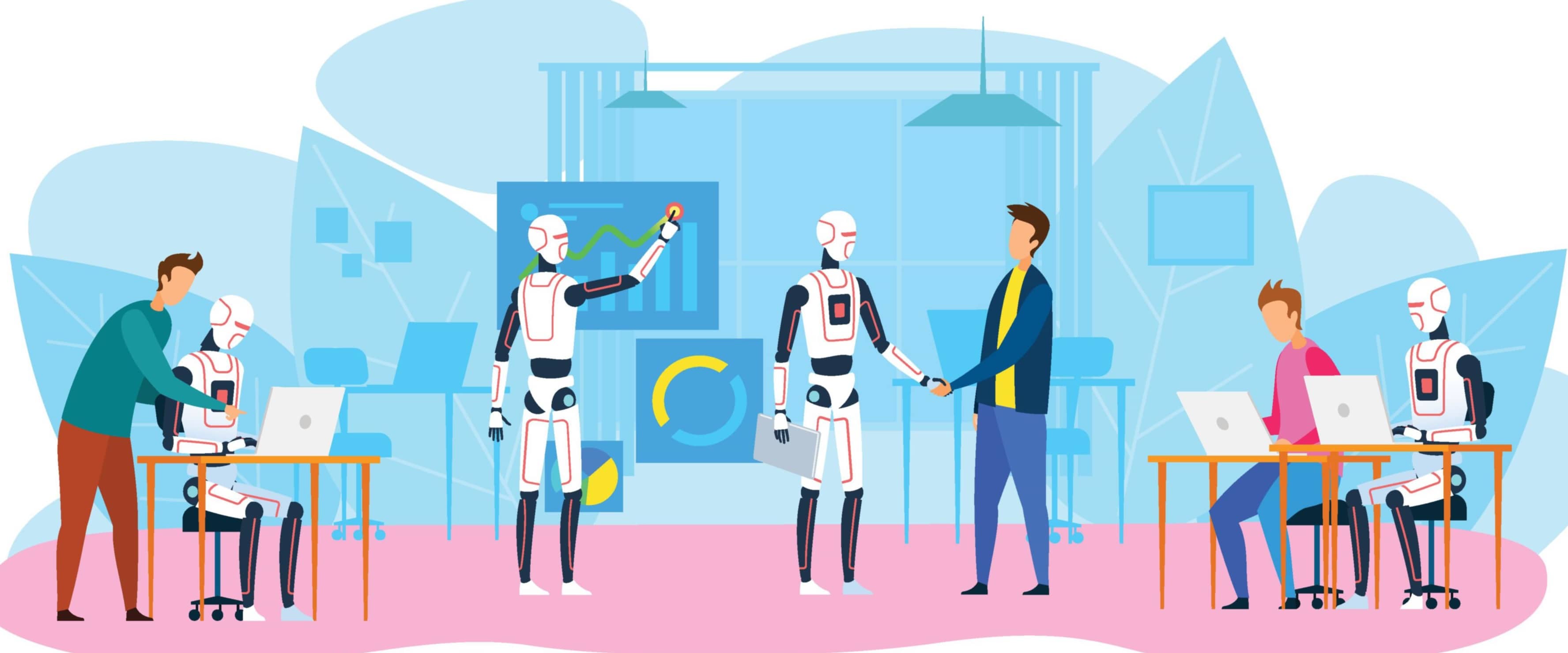The advent of artificial intelligence calls for a rethinking not only of humanity’s relationship with machines, but of how we, as a society, define and reward the fruits of human labour.

When the computerized word processor supplanted the typewriter, responsibility for producing day-to-day business correspondence shifted from typist to manager. This made document production much more efficient as it eliminated the round trip from Dictaphone through typing pool and back to the author for approval. This increase in efficiency didn’t occur overnight though. Word processors may have promised to make managers more productive, but many initially balked at using them because it didn’t suit their personal work habits, nor did they see it as a task fit for their station.
Crafting their own documents meant that managers needed to acquire composition and proofreading skills, as well as the more technical skills (such as typing and functional digital literacy) required to operate a word processor. But perhaps the most fundamental change they had to make was in their mindsets. To effectively use a word processor, they had to build a relationship with this new technology, trusting that colorful squiggly underlines actually indicated errors, that saved documents could be retrieved at will and that the machine wouldn’t crash (well, not too often anyway). Building this trust — integrating the new tool into their personal work habits — took time, as people were naturally loath to abandon old attitudes and behaviors.
Most managers did come to embrace word processors, with the result that these types of a machine not only became widespread but fundamentally changed the way business correspondence is produced. Along with this change came a shift in social norms. Typing is now considered an important skill to be taught to children in school, while executives no longer see typing as beneath their role.
Diese Geschichte stammt aus der June 2019-Ausgabe von CEO India.
Starten Sie Ihre 7-tägige kostenlose Testversion von Magzter GOLD, um auf Tausende kuratierte Premium-Storys sowie über 8.000 Zeitschriften und Zeitungen zuzugreifen.
Bereits Abonnent ? Anmelden
Diese Geschichte stammt aus der June 2019-Ausgabe von CEO India.
Starten Sie Ihre 7-tägige kostenlose Testversion von Magzter GOLD, um auf Tausende kuratierte Premium-Storys sowie über 8.000 Zeitschriften und Zeitungen zuzugreifen.
Bereits Abonnent? Anmelden
Five Ways To Win The Consumer Of 2030, Now
To win the data and technology-enabled “smart consumer” of tomorrow, discover the five things every consumer-facing business must do right now
TWENTY FOR ‘20
WILL THE NEW DECADE BE AS TRANSFORMATIVE AS THE LAST? EY EXAMINES THE QUESTIONS THAT WILL SHAPE THE NEXT DECADE

ROBOTS ON THE MOVE
THE MARKET FOR PROFESSIONAL SERVICE ROBOTS IS POISED TO TAKE OFF WITH A VENGEANCE, FUELED BY NEW DEVELOPMENTS IN 5G TELECOM SERVICES AND AI CHIPS
POST-DIGITAL CULTURE SHOCK
COMPANIES AROUND THE WORLD ARE FOCUSING ON DIGITAL TRANSFORMATION, BUT MANY ARE OVERLOOKING THE CULTURE CHANGE NECESSARY FOR SUCCESS

FROM LOCAL TO GLOBAL
Winning sales organisations excel at these five essential capabilities

Shooting for the Stars
MANFRED BAUMANN SHARES HIS INSIGHTS INTO PROFESSIONAL PORTRAITURE

FLYING WHILE BLIND
I AM NOT ONLY AN EXPERIENCED TRAVELER; I AM AN EXPERIENCED BLIND PERSON…
THE ALCHEMIST OF HOSPITALITY
Puneet Chhatwal, the CEO and MD of Tata Group’s hospitality arm Indian Hotels Company, talks about how his company is reimagining and repositioning some of its most renowned brands, raising the hospitality bar, with an eye on the evolving customer and emerging concepts and trends
Robots Can Go All The Way To Mars, But They Can't Pick Up The Groceries?
In the popular imagination, robots have been portrayed alternatively as friendly companions or existential threat. But while robots are becoming commonplace in many industries, they are neither C-3PO nor the Terminator. Cambridge researchers are studying the interaction between robots and humans – and teaching them how to do the very difficult things that we find easy.

How To Create A Growth Mindset?
A growth-oriented mindset must be cultivated among the employees for business growth and sustenance. It requires a good understanding of people and what drives them